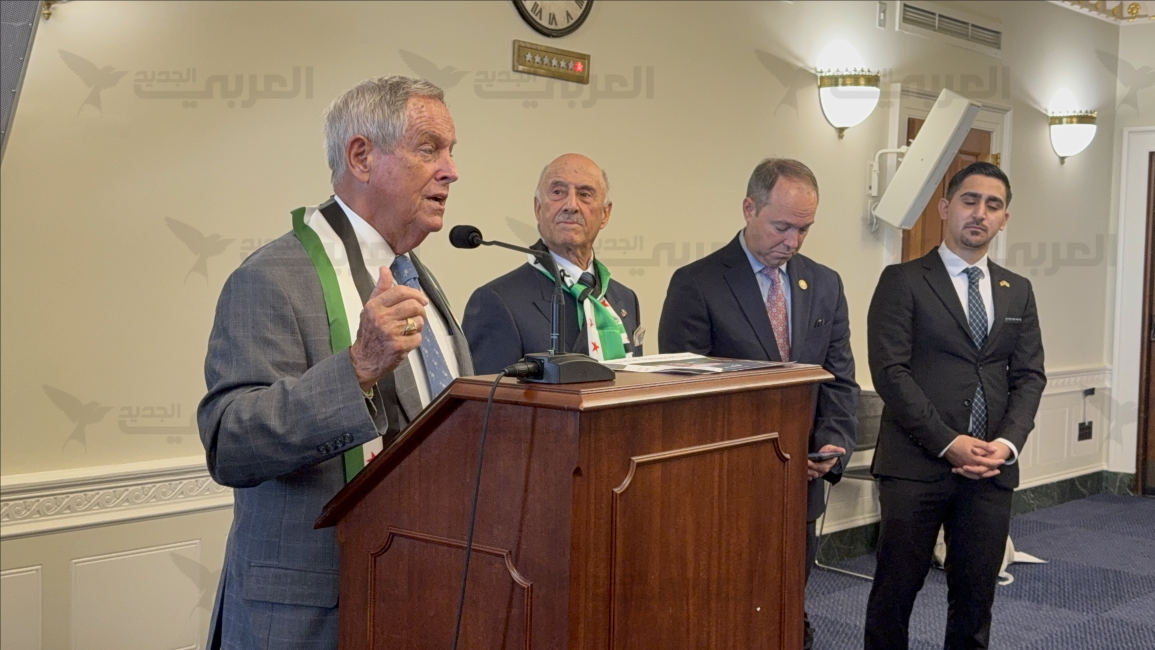The Caesar Law is set to be permanently canceled this month: Will the U.S. Congress believe it?
September 4, 202586 ViewsRead Time: 3 minutes

Font Size:
16
In a surprising development, it seems that the Caesar Law, which has been the cornerstone of U.S. sanctions on Syria over the past years, is nearing its end. Republican Congressman Joe Wilson, who appeared wearing a scarf of the Syrian flag during an event in the Capitol, expressed his "great optimism" about the cancellation of the law this month.
These developments come in the context of a radical shift in the U.S. stance on Syria following the fall of the Assad regime. Wilson, who recently visited Damascus, confirmed that lifting the sanctions would open the doors for long-term investments, saying: "When I visited Damascus, I found that there are very significant investment opportunities."
However, the potential cancellation of the sanctions is not without conditions. Wilson linked the cancellation to ensuring access to a "unified state that includes Bedouins, Druze, Alawites, and Kurds," referring to the importance of maintaining Syria's diverse social fabric.
It is also noteworthy that the American rhetoric towards Israeli aggression against Syria has shifted. Wilson stated that he "expressed his opposition to the recent bombing while he was in Damascus," calling for "giving Syria a chance." This position reflects a shift in the American vision that has begun to see Syrian stability as a benefit for all.
Behind these developments, there are concerted efforts by the Syrian American Council, which organized a comprehensive lobbying campaign. Zaid Aloush, the council's advocacy officer, clarified that "Syrian citizens flocked to Washington from all over the states" to demand the cancellation of sanctions that "no longer have justification after the fall of Bashar al-Assad's regime."
Despite the prevailing optimism, the road to the complete cancellation of sanctions remains fraught with challenges. The issue of lifting sanctions on Syria is still "complex and sensitive," according to the Syrian American Coalition for Peace and Prosperity, which indicated that a "lengthy and sensitive session" was held with the Chairman of the House Foreign Affairs Committee.
The cancellation of the Caesar Law will have significant implications for Syria and the region, most importantly opening the door for international investments in reconstruction, facilitating the return of refugees and displaced persons, enhancing economic stability in Syria, and improving Syrian-Arab and international relations.
This shift in the American stance represents a practical acknowledgment of the geopolitical changes in Syria following the fall of the Assad regime, and Washington's desire to open a new page with Damascus. However, success will depend on the ability of the Syrian parties to achieve national unity and the stability that the Syrian people have long awaited.
These developments come in the context of a radical shift in the U.S. stance on Syria following the fall of the Assad regime. Wilson, who recently visited Damascus, confirmed that lifting the sanctions would open the doors for long-term investments, saying: "When I visited Damascus, I found that there are very significant investment opportunities."
However, the potential cancellation of the sanctions is not without conditions. Wilson linked the cancellation to ensuring access to a "unified state that includes Bedouins, Druze, Alawites, and Kurds," referring to the importance of maintaining Syria's diverse social fabric.
It is also noteworthy that the American rhetoric towards Israeli aggression against Syria has shifted. Wilson stated that he "expressed his opposition to the recent bombing while he was in Damascus," calling for "giving Syria a chance." This position reflects a shift in the American vision that has begun to see Syrian stability as a benefit for all.
Behind these developments, there are concerted efforts by the Syrian American Council, which organized a comprehensive lobbying campaign. Zaid Aloush, the council's advocacy officer, clarified that "Syrian citizens flocked to Washington from all over the states" to demand the cancellation of sanctions that "no longer have justification after the fall of Bashar al-Assad's regime."
Despite the prevailing optimism, the road to the complete cancellation of sanctions remains fraught with challenges. The issue of lifting sanctions on Syria is still "complex and sensitive," according to the Syrian American Coalition for Peace and Prosperity, which indicated that a "lengthy and sensitive session" was held with the Chairman of the House Foreign Affairs Committee.
The cancellation of the Caesar Law will have significant implications for Syria and the region, most importantly opening the door for international investments in reconstruction, facilitating the return of refugees and displaced persons, enhancing economic stability in Syria, and improving Syrian-Arab and international relations.
This shift in the American stance represents a practical acknowledgment of the geopolitical changes in Syria following the fall of the Assad regime, and Washington's desire to open a new page with Damascus. However, success will depend on the ability of the Syrian parties to achieve national unity and the stability that the Syrian people have long awaited.